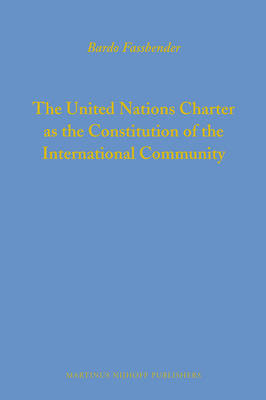
- Afhalen na 1 uur in een winkel met voorraad
- Gratis thuislevering in België vanaf € 30
- Ruim aanbod met 7 miljoen producten
- Afhalen na 1 uur in een winkel met voorraad
- Gratis thuislevering in België vanaf € 30
- Ruim aanbod met 7 miljoen producten
Zoeken
The United Nations Charter as the Constitution of the International Community
Bardo Fassbender
€ 225,95
+ 451 punten
Omschrijving
The "constitutionalization" of international law is one of the most intensely debated issues in contemporary international legal doctrine. The term is used to describe a number of features which distinguish the present international legal order from "classical" international law, in particular its shift from bilateralism to community interest, and from an inter-state system to a global legal order committed to the well-being of the individual person. The author of this book belongs to the leading participants of the constitutionalization debate. He argues that there indeed exists a constitutional law of the international community that is built on and around the Charter of the United Nations. In this book, he explains why the Charter has a constitutional quality and what legal consequences arise from that characterization.
Specificaties
Betrokkenen
- Auteur(s):
- Uitgeverij:
Inhoud
- Aantal bladzijden:
- 228
- Taal:
- Engels
- Reeks:
- Reeksnummer:
- nr. 51
Eigenschappen
- Productcode (EAN):
- 9789004175105
- Verschijningsdatum:
- 7/04/2009
- Uitvoering:
- Hardcover
- Formaat:
- Genaaid
- Afmetingen:
- 168 mm x 244 mm
- Gewicht:
- 521 g

Alleen bij Standaard Boekhandel
+ 451 punten op je klantenkaart van Standaard Boekhandel
Beoordelingen
We publiceren alleen reviews die voldoen aan de voorwaarden voor reviews. Bekijk onze voorwaarden voor reviews.








